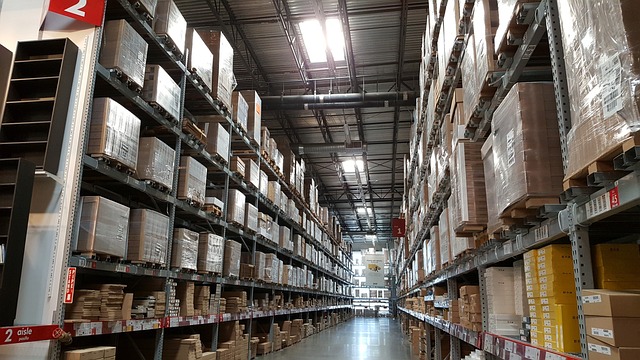A warehouse inventory management system is essential for any successful business. In most cases, it might be the difference between success and failure. With a streamlined system in place, businesses have greater accuracy of stock levels and real-time visibility into multiple warehouses, allowing them to respond quickly to customer needs while avoiding costly delays in production or customer service issues caused by inaccurate inventories. But that’s just the beginning! There are several other key reasons why a warehouse inventory management system is essential – read on to know more about how this type of implementation can benefit your business.
7 Reasons Warehouse Inventory Management Is Important For A Business
1. Helps In Maintaining Optimal Stock Levels
Maintaining optimal stock levels is crucial for businesses of all sizes, and a warehouse inventory management system can make all the difference. Staying on top of inventory levels ensures you have the correct amount of product on hand at all times, allowing you to fulfill customer orders quickly and efficiently.
With a proper inventory management system, you can track stock levels in real-time, schedule restocking orders, and prevent overstocking or understocking issues.
Along with streamlining operations and increasing productivity, a warehouse inventory management system can save you time and money in the long run. So, if you haven’t already, consider investing in an inventory management system for your business today.

2. Enables Efficient Space Utilization
Warehouse inventory management is vital for any business that operates on a large scale. One of the key benefits of a well-managed inventory is that it enables efficient space utilization within the warehouse.
With proper inventory management, businesses can maximize their storage and operational capacity, ultimately increasing their productivity and profitability. When inventory is stored and organized thoughtfully and strategically, businesses can avoid costly mistakes such as over-ordering or understocking, which can cause delays and inefficiencies in the supply chain.
By investing in effective inventory management processes, businesses can streamline their operations and free up valuable resources, leading to better business outcomes.
3. Facilitates Effective Order Fulfillment
Effective warehouse inventory management is crucial for the success of any business. One of the key benefits of a well-managed warehouse inventory is facilitating order fulfillment. This means ensuring that orders are accurately fulfilled, packaged, and shipped to the customer on time.
When a business has a streamlined inventory management system, order fulfillment can be expedited, reducing the risk of errors, delays, and other costly mistakes. This, in turn, enhances customer satisfaction and loyalty, which is vital for the sustainability of any business.
A successful warehouse inventory management system ensures that the appropriate products are available at the right time, providing businesses with a competitive edge in the market.
4. Allows For Cost-Effective Inventory Control
For any business dealing with inventory, effective inventory management’s importance cannot be overstated. Warehouse inventory management is an integral part of a successful business operation as it enables cost-effective control of stock levels.
This ensures businesses can regulate inventory levels, eliminate inventory shortages or overstocks, and minimize waste. As a result, businesses are better positioned to meet customer demands, reduce costs, use the workspace better, and increase efficiency.
With the proper inventory management system, businesses can achieve enhanced control over their inventory, resulting in better financial management and, ultimately, more profitability.
5. Improves Accuracy In Order Processing And Shipment
Warehouse inventory management is a crucial aspect that determines the success of a business. Accurate order processing and shipment can make a difference between satisfied and disgruntled customers.
By implementing a well-thought-out inventory management system, businesses might have access to real-time data that will help them track and manage inventory levels effectively. This can reduce the likelihood of stockouts or overstocking, impacting customer satisfaction.
Warehouse inventory management can also enhance operational efficiency, streamline workflows and reduce errors, and ultimately increase profits. Therefore, for businesses to remain competitive and relevant in their respective markets, implementing an inventory management system that ensures accuracy in order processing and shipment should be a top priority.
6. Enhances Transparency And Traceability In The Supply Chain
Warehouse inventory management is a crucial aspect that businesses cannot ignore, as it enhances transparency and traceability in the supply chain. With accurate inventory tracking, businesses can easily monitor goods moving throughout the supply chain, from the manufacturer to the end consumer.
This helps ensure that the correct goods in the right quantities are delivered to the right customers on time. An effective inventory management system also helps cut costs by reducing overstocking and spoilage while improving customer satisfaction and loyalty.
In today’s fast-paced business environment, where competition is fierce, good inventory management strategies can be an invaluable tool for any business seeking to thrive in the market.
7. Increases Overall Productivity And Profitability
Warehouse inventory management is a crucial element in every successful business. It involves identifying, tracking, and controlling products or materials that come in and out of the warehouse.
By effectively managing inventory, businesses can increase their overall productivity and profitability. With the correct inventory management system in place, businesses can quickly access data about their inventory levels, sales trends, and reorder points. They can then decide when to restock, how much to reorder, and even which supplier to use.
This saves time and money and ensures that customers always have access to the products they need. Overall, warehouse inventory management is critical to running a successful business, and implementing an effective system can significantly improve its operational efficiency.

Things To Consider While Choosing A Warehouse Inventory Management For Your Business
When it comes to managing your warehouse inventory, it’s essential to choose the right system for your business. There are various factors to consider, including the size of your warehouse, the number of products you stock, and the level of automation you’re looking for.
One important consideration is the system’s ease of use, as you want to quickly access information about your inventory. You might also want to think about the level of support the vendor provides, the price of the system, and any ongoing maintenance costs.
By carefully considering these factors, you can choose a warehouse inventory management system to help your business operate more efficiently and effectively.


